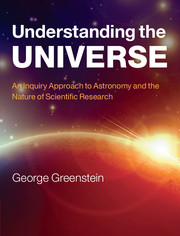Book contents
- Frontmatter
- Contents
- Preface
- Acknowledgments
- Part I Introducing steps to astronomy
- Part II The Solar System
- Part III Introducing stars
- Part IV Introducing galaxies and the Universe
- 16 The Milky Way Galaxy
- 17 Galaxies
- 18 Cosmology
- 19 Life in the Universe
- Epilog
- Appendix I The small-angle formula
- Appendix II Exponential notation
- Appendix III The Solar System
- Appendix IV The closest and brightest stars
- Appendix V Physical and astronomical constants
- Appendix VI Conversion factors
- Appendix VII Constellation maps
- Glossary
- Figure Credits
- Index
- Plate section
18 - Cosmology
from Part IV - Introducing galaxies and the Universe
Published online by Cambridge University Press: 05 February 2013
- Frontmatter
- Contents
- Preface
- Acknowledgments
- Part I Introducing steps to astronomy
- Part II The Solar System
- Part III Introducing stars
- Part IV Introducing galaxies and the Universe
- 16 The Milky Way Galaxy
- 17 Galaxies
- 18 Cosmology
- 19 Life in the Universe
- Epilog
- Appendix I The small-angle formula
- Appendix II Exponential notation
- Appendix III The Solar System
- Appendix IV The closest and brightest stars
- Appendix V Physical and astronomical constants
- Appendix VI Conversion factors
- Appendix VII Constellation maps
- Glossary
- Figure Credits
- Index
- Plate section
Summary
So far in this book we have been concerned with individual things – with moons and planets, with stars and nebulae and galaxies. Now we move on to study, not Things, but Everything. What is the nature of the Universe as a whole?
Our answers to this question have continually evolved. When we were babies “the world” consisted of little more than our homes and families. As we grew older, our worlds expanded to include other families, school and friends, our home town. This kind of expansion is also true historically. Primitive peoples regarded their immediate vicinity to be “the world.” Early societies, such as the ancient Greeks, drew larger maps, and as we see in Figure 18.1 their maps grew ever more comprehensive. With the scientific revolution (Figure 18.2) the view expanded immensely. But even here the view was strictly limited: in Figure 18.2 the entire Universe beyond the orbit of Saturn is represented merely as a single sphere of “fixed stars.”
This book has followed the same path. We began with a study of the relatively nearby – the Solar System – and progressively moved to more and more distant objects. Perhaps we are ready for yet another giant expansion. It is the greatest of them all – out into what may well be infinite.
Olbers’ Paradox: why is it dark at night?
Perhaps the most profound question that we can ask about the Universe is whether it is infinite. Does the cosmos extend endlessly far into the depths? Or does it have an edge?
There is a fascinating paradox related to this question. If the Universe is infinite it would contain an infinite number of stars, and taken together they would emit an infinite amount of light. So why don’t we receive an infinite amount of light? Why is it dark at night?
- Type
- Chapter
- Information
- Understanding the UniverseAn Inquiry Approach to Astronomy and the Nature of Scientific Research, pp. 529 - 561Publisher: Cambridge University PressPrint publication year: 2013



